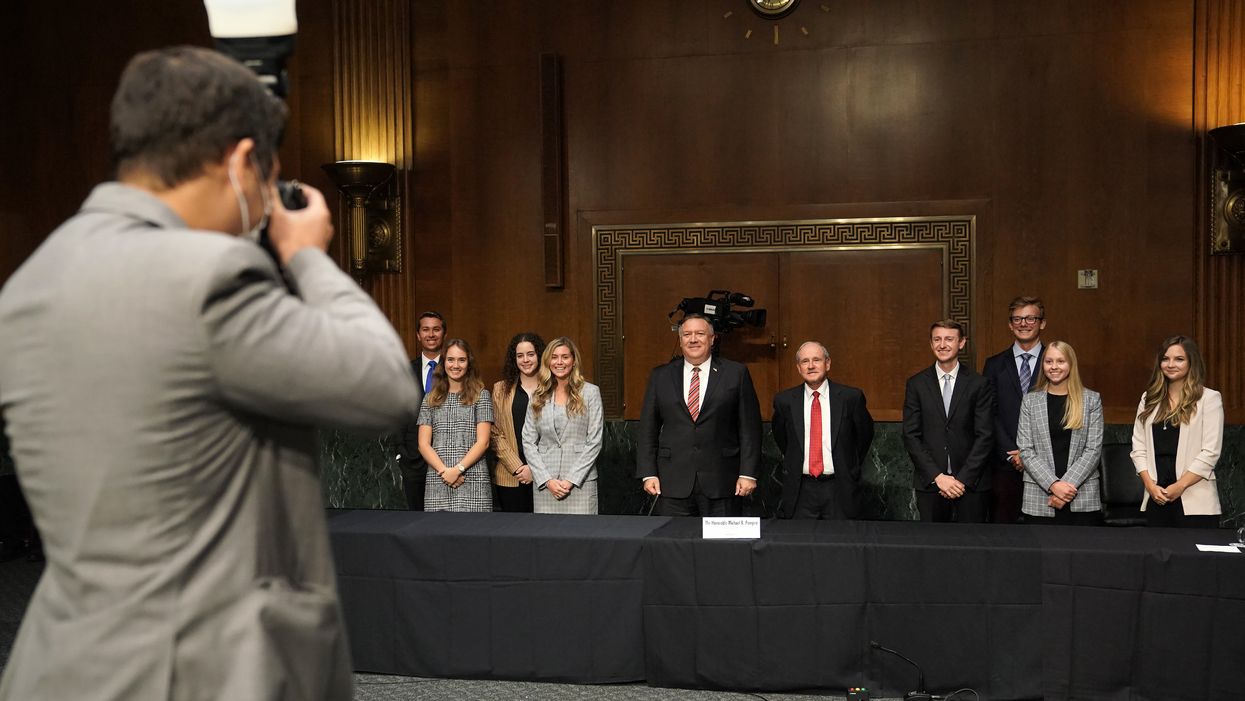Remote work is changing congressional internships, and that's not all bad news.
Remote internships are expanding opportunity and bridging the traditional gulf between Capitol Hill and members' offices in their districts, although they can be tough for offices — and interns — to navigate. Several organizations are stepping up to provide resources and support to ensure that offices are able to continue their internship programs in these exceptional times.
A recent webinar on managing successful remote internships in the era of Covid-19 — hosted by College to Congres s, the Congressional Management Foundation and the Modernization Staff Association — featured new research on the prevalence of remote internships, and a few surprising benefits. Remote work has "leveled the playing field" for staffers in D.C. and their colleagues in the field, a study by CMF revealed, and helped make interns and full time staff in the district feel more connected to the policy work occurring in Washington.
Today's interns are tomorrow's staffers. So it is essential these positions remain available, even remotely, both for the help they provide to offices and the important opportunity for young people to learn about Congress. Last year, the House took a significant step to expand the internship pipeline by authorizing $25,000 a year for every office to help pay interns. These stipends make it easier for students from a variety of backgrounds and economic situations to spend time on the Hill. And now the House has refined the rules to allow $10,000 annually in compensation for district office interns.
During the pandemic, though, most interns are limited to remote work, a development that may actually expand opportunities for students around the country to (virtually) experience Capitol Hill. In an example that may be applicable to Congress, NPR received 20,000+ applications for its internships this year — a tenfold increase over the year before that it attributed to the potential for remote interns to work from anywhere. As one producer tweeted, it's "almost like our industry's reliance on NYC- and DC-based jobs is reducing our potential talent pool."
The executive director of Pay Our Interns, Carlos Mark Vera, explains: "The vast majority of internship opportunities are concentrated in five cities across the country — Washington, New York City, San Francisco, Chicago and Los Angeles. That puts working class youth who cannot afford to relocate at a severe disadvantage and limits their opportunities. Capitol Hill internships are no different. Remote congressional internships can level the playing field by taking relocation and housing costs out of the equation, but it is still important for offices to pay interns. While those working remotely do not have the same expenses as an in-person internship, many still have to pay bills."
Hiring and managing remote interns can be challenging, however, and some offices chose to reduce or suspend their programs this summer. "The lack of interns has increased the workload of staff, particularly the constituent services team," CMF's Bradley Sinkhaus said. "One office mentioned that interns 'are invaluable in rural districts' and offices miss having interns to mentor and train."
A significant complication is the limitation on access to technology for unpaid House interns. Paid interns can be provided with official devices and remote access to the office network. But unpaid interns are not allowed to access personal constituent information, like correspondence or casework, if working from home.
Offices have been getting inventive in creating substantive remote programs that benefit both the interns and the office — having interns compile press clips, write responses to form letters (that are then sent through the office system by a staffer), draft speeches, suggest social media posts, and take notes at meetings, hearings and briefings.
Several organizations collaborated on a "virtual intern project" to provide intern-specific resources. College to Congress, which provides training, mentoring and financial support for Hill interns, recently announced its online curriculum C2C-U will be available for free to all congressional interns for the rest of the year. Its training modules span the gamut from the legislative process to writing constituent letters, and can help lighten the load for intern coordinators within congressional offices. "All of our online resources apply to both in-person and remote working positions," CEO Audrey Henson said of her curriculum. "One of my biggest hopes is for more offices to take advantage of this opportunity to hire from a wider range of backgrounds since remote working has eliminated some of the large, prohibitive expenses."
Also, the Modernization Staff Association has updated its Capitol Hill Work From Home Guide with tips for junior staffers and intern coordinators. CMF maintains guidance for a successful internship program. And Popvox is sharing a weekly newsletter to keep Hill interns connected and informed — even when operating remotely.
Not surprisingly, many of the people spearheading these efforts are former interns. We know Hill internships open doors and change lives, and that Capitol Hill is better for the energy and perspective these young (and sometimes not-so-young) people bring. As Congressional offices begin to make their plans for the fall, we strongly encourage them to offer internships and to tap into available resources to make these internships a success.



















Trump & Hegseth gave Mark Kelly a huge 2028 gift